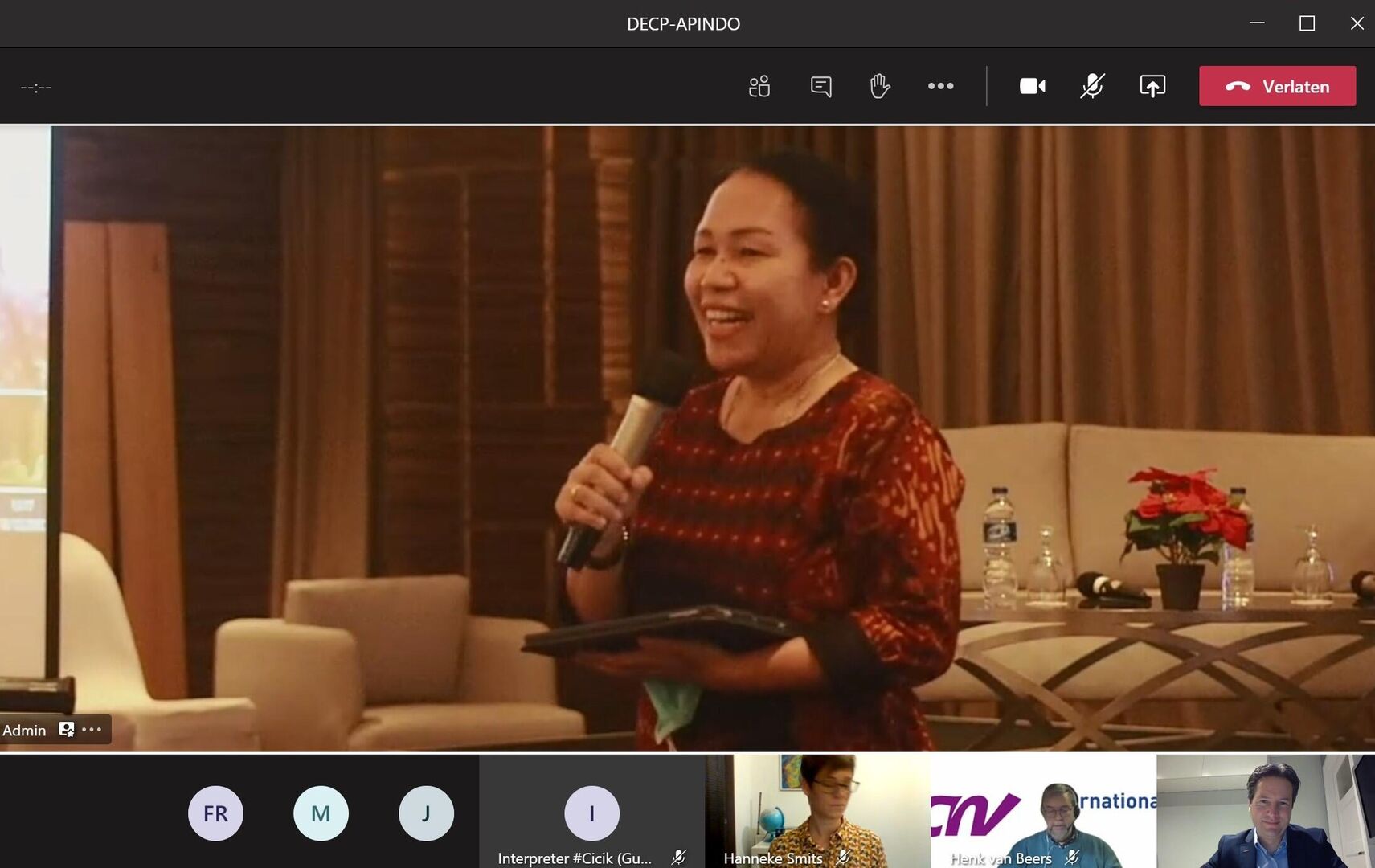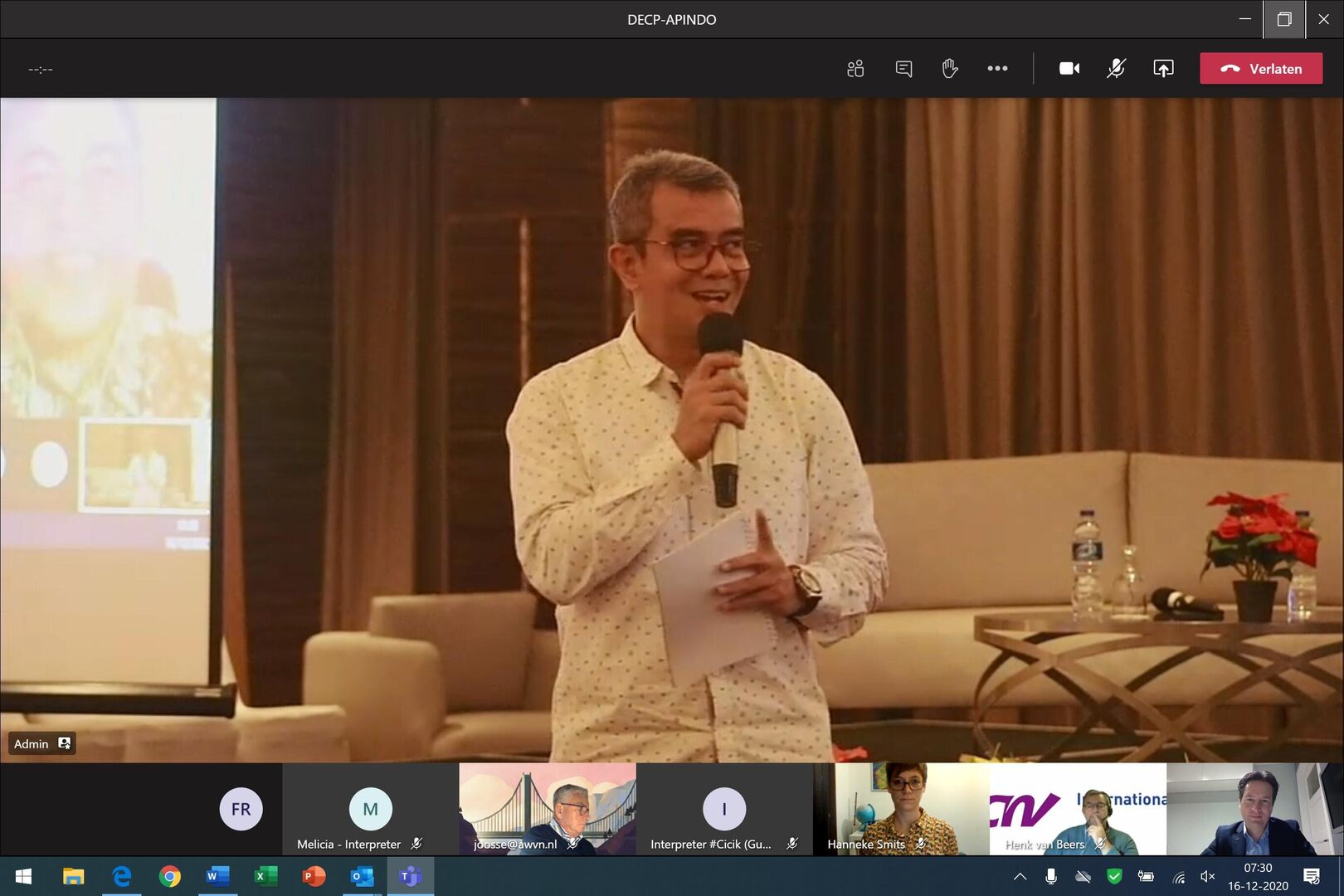

Successful seminars on Social Dialogue development in Indonesia
Both the Covid-19 pandemic and the introduction of The Omnibus Law (Job Creation Law) make a successful Social Dialogue (SD) more than necessary. Applying a high-quality SD will help parties to preserve harmonious relations and prevent conflict. Due to the Covid-19 pandemic APINDO and KSBSI decided to organize the SD development, as foreseen during their cooperation in the SD project, online.
APINDO and KSBSI asked their team of certified SD trainers (trained by DECP and CNV Internationaal ) to organize a first online seminar in August 2020. In this seminar the trainers shared the principles for a successful SD. And they facilitated role plays to familiarize the participants with good practices in SD on issues directly related to their day-to-day work regarding the Pandemic as well as the Omnibus Law. Four regions (Jakarta, Medan, Bandung and Makassar) were involved with 20 bipartite participants each. Coordination was centralized in Jakarta. In their opening speeches, APINDO director Mr. Danang Girindrawardana and KSBSI president Ms. Elly Rosita both highlighted the need for this seminar on the short term and a successful SD in the long term. Both directors of DECP Mr. Bongaerts and CNV Internationaal Mrs. Maij agreed with the approach of the Indonesian partners.
After the opening speeches the regions introduced themselves and told about their challenges. The combination of Theory and Role Play as applied in the simultaneous workshops on four locations worked well. Participants could experience in a laboratory setting how dialogue about the issues would work out. Some interesting learning points popped up from the role plays. Most remarkable: the need for good compromising techniques and more information on how a package deal works, the importance of a good preparation of the SD, the difference between what parties want (their demands) and what they actually need. Last but not least, the participants learned how successful it is in the dialogue if te focus is on needs instead of demands.
What are the lessons learned from this first online seminar? First of all, the awareness of the need for a high quality SD is no longer a question for discussion. All participants showed their enthusiasm about the approach having in mind the endless history of conflicts between parties, especially when solutions in the favor of all parties are needed. Another interesting issue was the idea brought forward by the Trade Union KSBSI to stimulate employers to become member of APINDO because they educate their members to be trustworthy employers. Online meetings do, however, have their limitations. Especially when it comes to focus on personal feelings of participants. These feelings, and the way they are dealt with in the mutual relations between parties, are the fundaments of trust in the relation between the parties and their representatives. Being in one room together as parties involved in labor relations will lead to listening and understanding each other much better.

APINDO and KSBSI prolong the dissemination of SD in Indonesia despite the pandemic measures
After this first online seminar the partners in this SD project decided to arrange a follow up in December 2020. Directly after the first seminar, parties decided to make plans for the future in order to achieve a prolongation of what was started. Participants for this second seminar were the certified Indonesian trainers and representatives from the Garment and Palm Oil Sectors. With the experiences and knowledge gathered in the first seminar the questions raised how to prolong the dissemination of SD even better in the very near future. In the invitation letter the following purpose of the meeting was written:
“Job Creation Law (Omnibus Law) becomes a prominent issue in Indonesia during pandemic predominantly under President of Republic Indonesia Joko Widodo, when he announced that this specific regulation should immediately be ratified despite the incremental cases of corona in Indonesia. This contentious law, initially expected to attract the FDI to Indonesia and heavily aimed at supply chain relocation, where this specific opportunity has not maximally been utilized during Trade War situation. Thus, it requires an insightful discussion in reaching the balance agreement on Omnibus Law objective through excellent social dialogue strategies. Therefore APINDO and KSBSI in collaboration with CNV and DECP proposed a one day seminar on social dialogue on the Omnibus Law with as a main theme Social Dialogue for Devising a Negotiation Strategy Post Omnibus Law.”
This very firmly stated purpose left no doubt about the importance of this situation in the current circumstances as was stipulated once again in all opening speeches of the Chief Representatives of APINDO, KSBSI, CNV Internationaal and DECP.
Ministry of Manpower representative Mr. Rizza requested once again that extra attention be given to the expert-, scientific- and government points of view, resulting in a good SD in the current situation. His points were remarkably well in accordance with the DECP and CNV approach of the SD in the Training of Trainers programmes and in the trainings and workshops DECP hosted up till now. He also pointed out the opportunities that The Omnibus Law offers for more negotiations at regional and company level. This will require more training by APINDO and KSBSI specialists involved on those levels.
Good examples of best practices were given by two participants from East Kalimantan. Both had participated the past 4 years in the DECP/ CNV-I trainings and and now they brought their knowledge into practice. Also in this event the KSBSI mentioned that they advise their members to become member of APINDO, to improve the cooperation with Trade Unions.
In the next part of the seminar “Communication Structure in Negotiation Strategy as a solid base for SD” once again participants debated on how to improve communication. Not only communication structures but also communication skills and what basic attitude is needed to achive a successful SD. Bottom line again: high quality SD is needed to clarify the issues among partners in Industrial Relations.
Conclusion: these two seminars are a very important step in the process in which the final goal ‘Dissemination of SD to achieve harmonious Labor Relations’ got an extra boost despite the restrictions in this period. An extensive plan of activities for 2021/ 2022 will be the result to achieve the mentioned goals.